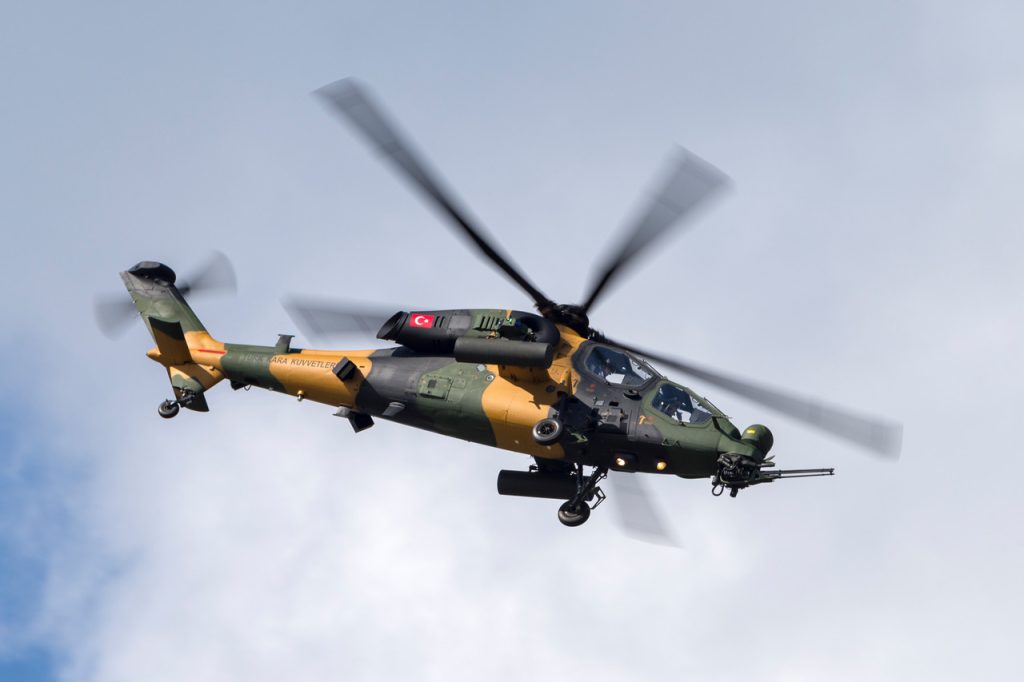Facebook Twitter Instagram Somali Magazine - People's Magazine
Somalia is poised to significantly enhance its military capabilities with the anticipated acquisition of Turkish-made T129 ATAK helicopters. These advanced attack helicopters, developed by Turkish Aerospace Industries, are expected to bolster the Somali Air Force (SAF) in its ongoing fight against insurgent groups, including the Al-Qaeda-linked Al-Shabaab. The move marks a pivotal step in Somalia’s efforts to modernize its defense infrastructure and assert greater control over its security landscape.
The T129 ATAK is a twin-engine, multirole attack helicopter designed for armed reconnaissance and precision strikes in challenging environments. Equipped with advanced avionics, including a helmet-mounted sight and GPS-integrated navigation systems, the helicopter is capable of operating in all weather conditions, day or night. Its agility and firepower make it a formidable asset for counterinsurgency operations, particularly in Somalia’s rugged terrain where ground forces often face logistical challenges.
Reports indicate that Somali pilots and soldiers have been undergoing training in Turkey to operate the T129 ATAK, as well as other helicopter models. This training underscores the deepening military cooperation between Somalia and Turkey, a partnership that has grown significantly in recent years. The establishment of the TURKSOM military base in Mogadishu has been a cornerstone of this collaboration, providing Somali forces with training and access to advanced military technology.
The acquisition of the T129 ATAK helicopters aligns with Somalia’s broader strategic objectives to enhance its operational capabilities and reduce reliance on foreign military interventions. The helicopters are expected to play a critical role in countering Al-Shabaab, which has exploited Somalia’s limited airpower to maintain control over key territories. With the T129’s ability to conduct rapid-response missions and precision strikes, Somali forces will be better equipped to neutralize insurgent strongholds and disrupt supply routes.

In addition to the T129 ATAK, Somalia is reportedly acquiring Bayraktar Akıncı drones from Turkey, further expanding its aerial capabilities. These unmanned combat aerial systems will complement the helicopters, providing a comprehensive approach to surveillance and targeted operations. Together, these assets represent a significant upgrade for the SAF, which has been rebuilding its capabilities since reopening its headquarters in 2015.
While the acquisition of the T129 ATAK helicopters is a promising development, challenges remain. Integrating and maintaining such advanced equipment requires substantial resources, including skilled personnel and logistical support. Somalia’s defense sector, historically underfunded and reliant on donor assistance, will need to address these constraints to fully leverage the capabilities of the new helicopters.
The move has also drawn attention to the geopolitical implications of Somalia’s growing ties with Turkey. As Turkey expands its influence in Africa through military and economic partnerships, its support for Somalia underscores its strategic interests in the Horn of Africa. The partnership has been mutually beneficial, with Somalia gaining access to advanced military technology and Turkey strengthening its foothold in a region of strategic importance.
The introduction of the T129 ATAK helicopters is expected to have a transformative impact on Somalia’s security landscape. By enhancing the SAF’s ability to conduct independent operations, the helicopters will contribute to Somalia’s sovereignty and its efforts to build a more stable and secure future. As the country continues to face persistent threats from insurgent groups, the acquisition of these advanced aerial assets represents a critical step forward.

